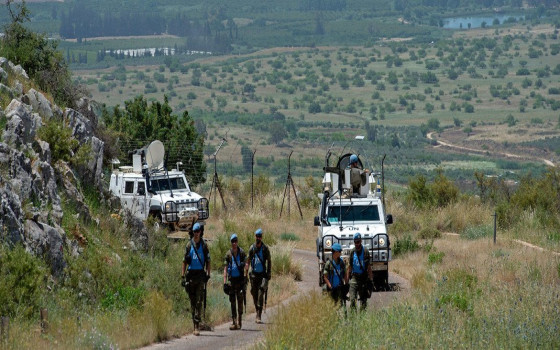
The situation in Lebanon: The United Nations affirms support for all parties to fulfill their obligations during this critical period, and Hezbollah says: The opportunity we are offering for a diplomatic solution is not open... and we will not allow our weapons to be disarmed.

- Europe and Arabs
- Saturday , 19 April 2025 6:10 AM GMT
Beirut - New York: Europe and the Arabs
United Nations Under-Secretary-General for Political and Peacebuilding Affairs, Rosemary DiCarlo, concluded a visit to Lebanon, following up on the visit of the UN Secretary-General last January, to reaffirm the unwavering support of the United Nations to the country during this critical period.
A statement issued by the Office of the UN Spokesperson stated that Ms. DiCarlo conveyed the United Nations' support to the parties in fulfilling their obligations under the Cessation of Hostilities Agreement and fully implementing resolution 1701 (2006) and all other relevant Security Council resolutions, including through the United Nations Interim Force in Lebanon (UNIFIL) and the Office of the United Nations Special Coordinator for Lebanon.
Ms. DiCarlo also reaffirmed the United Nations' support for the Government of Lebanon as it seeks to advance its critical reform agenda and expand state authority.
On 17 April, the Under-Secretary-General visited the UNIFIL peacekeeping mission and its area of operations in southern Lebanon to witness firsthand the repercussions of the recent hostilities on villages along the Blue Line. In the same context, European media reports stated that Hezbollah Secretary-General Naim Qassem's speech sent messages to various parties, domestically, regionally, and internationally. He indicated that the party had implemented its obligations under Resolution 1701, accused Israel of failing to implement its obligations, and emphasized the party's rejection of calls to disarm.
Hezbollah Secretary-General Naim Qassem emphasized that the "diplomatic deadline" agreed to by the party is not open-ended, and called on those calling for the party's "disarmament to remove this concept from their vocabulary." According to what was published by the Brussels-based Euronews website, Qassem indicated in a televised speech that the party "fully complied with the ceasefire agreement." He explained that the agreement agreed to by the party "is limited exclusively to the area south of the Litani River, and this is mentioned five times in it." He indicated that this agreement constitutes an implementation mechanism for UN Resolution 1701 and is not a new agreement. Hezbollah's Secretary-General accused Israel of failing to implement the agreement, warning that it "is not content with occupying Palestine, but also wants to occupy and weaken Lebanon and annex areas in southern Lebanon to its settlements."
Qassem's speech comes at a time of heightened debate in Lebanon about the implementation of UN Resolution 1701, in addition to the American position recently expressed by Deputy Special Envoy to the Middle East, Morgan Ortagus, who said in press statements a few days ago, "Lebanon is committed to Resolution 1701, which stipulates the disarmament of Hezbollah."
Qassem announced that the party would not discuss any further provisions of Resolution 1701 before Israel fulfills its obligations.
"Moving to the second phase of the ceasefire agreement requires first implementing the first phase, which includes Israel's withdrawal from south of the Litani River, the cessation of its attacks, including air violations, and the beginning of actual reconstruction," Qassem added. Israel did not withdraw from Lebanese border territory as stipulated in the ceasefire agreement and established positions at five border points, which Lebanon asserts constitutes an occupation of its territory.
Official Lebanese statistics indicate that since the ceasefire agreement began on November 27, Israel has committed "more than 2,700 violations of the agreement." Lebanese President Joseph Aoun warned that continued "Israeli violations of the agreement could lead to the collapse of stability in southern Lebanon."
Qassem emphasized "three basic rules that must govern any Lebanese dialogue on defense strategy: protecting Lebanon's sovereignty and liberating its territory, investing the strength and weapons of the resistance in any defense strategy, and halting all forms of aggression against Lebanon."
He noted the exchange of positive messages with Aoun regarding the implementation of the agreement south of the Litani River, affirming the party's readiness to participate in the dialogue when invited, "but not under pressure from the occupation."
"We will not discuss the defense strategy in the media, and we will discuss the details when the table convenes," he added. Qassem described the party's weapons as "the resistance's weapons and an untouchable red line," stressing that any attempt to remove them is a free service to the Israeli enemy and aims to incite discord between the resistance and the Lebanese army. He also asserted that these weapons have nothing to do with Lebanon's internal affairs. Lebanese President Joseph Aoun had indicated in press statements that "Lebanon will not replicate the experience of the Iraqi Popular Mobilization Forces, and Hezbollah will not be absorbed as a special entity within the army," but rather that "the party's fighters can join the Lebanese army."












No Comments Found